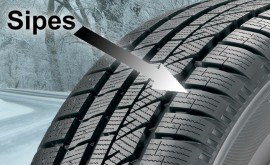You might want to drive all year long on winter tires to save money, time or both, but that you shouldn’t do it.
 First, let’s look at what makes winter tires good in the snow. Unlike summer or all-season tires, winter tires can stay soft and flexible in cold weather. Additionally winter tires have different tread patterns and sipes that allow them to bite into snow and ice to get additional traction.
First, let’s look at what makes winter tires good in the snow. Unlike summer or all-season tires, winter tires can stay soft and flexible in cold weather. Additionally winter tires have different tread patterns and sipes that allow them to bite into snow and ice to get additional traction.
These two features allow winter tires to be effective on icy roads. The softer tire compound allows the tires to grip when temperatures drop below 44 degrees Fahrenheit or seven degrees Celsius.
“The compounds [in winter tires] are oriented to work at lower temperatures,” said Yokohama representative Phillip Diogenes. This is in contrast to all-season or summer tires, which become hard and lose almost all of their grip.
But in warmer weather, winter tires become too soft, which significantly impacts handling and performance. Instead of having a crisp feeling turn-in, like you would with a summer or all-season tire in ideal temperatures, a winter tire would feel slow to respond when used in warm weather.
SEE ALSO: Should You Buy Summer Tires?
Diogenes also pointed out that all the treads and grooves that are found on a winter tire would cause the tire to feel “squirmy” and unstable in warm and dry weather.
 “They will feel a bit “greasy” on the road with less adhesion.” he said. That affects safety and can cause longer braking distances.
“They will feel a bit “greasy” on the road with less adhesion.” he said. That affects safety and can cause longer braking distances.
Finally, choosing to use winter tires all year long will cause the tires to wear out irregularly. Not only will the tires degrade unevenly, but they will also cause additional noise as they wear.
Is there any potential advantage to driving on winter tires all year long? “They do deal with larger amounts of water effectively too which of course is encountered all year long like rain,” said Diogenes, but that could be said about a few all-season and summer tires too.
Is a Perfect Tire?
 If you’re looking to use one tire all year long in different weather conditions, then all-season tires are the solution for you. But be warned, they aren’t nearly as capable in snow as dedicated winter tires nor are they as grippy in warm weather as dedicated performance tires. The advantage of all-season tires is the ability to have adequate performance for pretty most of the year
If you’re looking to use one tire all year long in different weather conditions, then all-season tires are the solution for you. But be warned, they aren’t nearly as capable in snow as dedicated winter tires nor are they as grippy in warm weather as dedicated performance tires. The advantage of all-season tires is the ability to have adequate performance for pretty most of the year
Another option is the less compromised all-weather tire. Unlike an all-season tire, an all-weather tire features the same snowflake and mountain symbol as a winter tire, meaning it’s almost as capable in the snow and slush as a dedicated winter set of rubber. But unlike a winter tire, all-weather tires don’t get too soft in warm weather, making them appropriate in the spring and summer. If you don’t have the budget or space for dedicated winter and summer tires, these may be the best option. The most popular all-weather tires are the Nokian WRG2 and WRG3, while other options include the Hankook 4S, the Vredestein Quatrac and the Goodyear Fortera TripleTred.



Leave a Reply